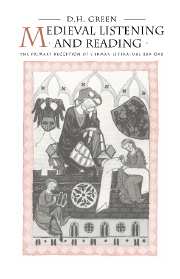Book contents
- Frontmatter
- Contents
- Preface
- List of abbreviations
- PART I Preliminary problems
- PART II Three modes of reception
- Introduction
- 3 Criteria for reception by hearing
- 4 Survey of reception by hearing
- 5 Criteria for reception by reading
- 6 Survey of reception by reading
- 7 Criteria for the intermediate mode of reception
- 8 Survey of the intermediate mode of reception
- PART III Conclusions
- Appendix Middle High German ‘lesen’ = ‘to narrate, recount, tell’
- Notes
- Bibliographical index
- Index of names
7 - Criteria for the intermediate mode of reception
Published online by Cambridge University Press: 04 September 2009
- Frontmatter
- Contents
- Preface
- List of abbreviations
- PART I Preliminary problems
- PART II Three modes of reception
- Introduction
- 3 Criteria for reception by hearing
- 4 Survey of reception by hearing
- 5 Criteria for reception by reading
- 6 Survey of reception by reading
- 7 Criteria for the intermediate mode of reception
- 8 Survey of the intermediate mode of reception
- PART III Conclusions
- Appendix Middle High German ‘lesen’ = ‘to narrate, recount, tell’
- Notes
- Bibliographical index
- Index of names
Summary
We have so far been concerned with the reception of German literature under two headings, by listeners and by readers. The reason for discussing these in separate chapters was clarity of presentation, but this should not lead to the conclusion that listening and reading were so opposed to one another that one could not coexist with the other. An obvious example is the Benedictine monastery, where monks heard works recited in the refectory, but were also expected to follow a fixed programme of reading for themselves. The same conjunction of listening with reading is why certain works have been mentioned in the preceding chapters under the heading of hearing and under that for reading. So far, such examples have been mentioned without any discussion of what is involved. Now we must make this good, discussing the implications when a work was intended for both modes of reception and how we may determine when this was the case.
It is necessary to stress this conjunction of hearing with reading against attempts to depict them as mutually exclusive. The firmest statement of the opposing view has been made by Lord, who says of the two techniques, oral and written, that they are ‘contradictory and mutually exclusive … The written technique … is not compatible with the oral technique.’ Finnegan has expressed doubts about the evidence for Lord's conclusion and has questioned whether his binary model on the basis of Yugoslav material can be transferred to other traditions as a universal explanation.
- Type
- Chapter
- Information
- Medieval Listening and ReadingThe Primary Reception of German Literature 800–1300, pp. 169 - 202Publisher: Cambridge University PressPrint publication year: 1994



